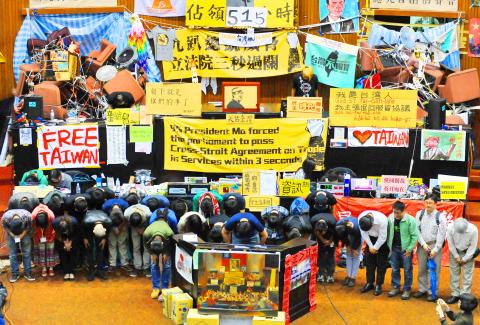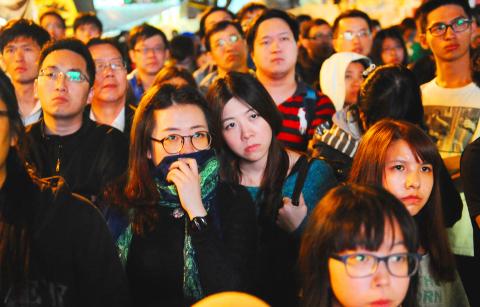Student protesters who have occupied the Legislative Yuan’s main chamber since March 18 will vacate the room at 6pm on Thursday, student leader Chen Wei-ting (陳為廷) said yesterday evening after long debates among the participating students and other groups.
Saying their 21-day occupation of the chamber to protest against the government’s handling of the cross-strait service trade pact “has demonstrated that we do not have to be restrained by the past political model and establishments or to have our fate determined by international powers,” Chen said the students have gathered enough support and strength to expand into a movement that incorporates everyone.
“We have shown how the ‘sovereignty of the people’ promised by the Constitution can be realized and become a real-life experience for our generation. And now we, the young, will be making strides from the legislature to the entire nation,” he said. “We will shift our strategy from the defensive to one that is ready to attack.”

Photo: AFP, Mandy Cheng
Chen said progress has been made on all four of the students’ major demand: the institutionalization of a cross-strait agreement oversight mechanism, the completion of such legislation before the review of the service trade agreement, the launching of a citizens’ constitutional conference and the retraction of the service trade agreement.
“The non-government version of a draft proposal for the institutionalization of an oversight mechanism, based on the principles of civic participation, legislative supervision, human rights protection, transparency and government accountability, has been proposed to the legislature,” Chen said.
The demand to “legislate first, review second” has met with a positive response from Legislative Speaker Wang Jin-pyng (王金平), who promised not to convene inter-party negotiations on service trade pact before oversight mechanism has been legislated, he said.

Photo: Chang Chia-ming, Taipei Times
The idea of a citizens’ constitutional conference has also been widely discussed in forums both outside and inside the Legislative Yuan over the past week, Chen said.
The demand that the controversial service trade pact be retracted was answered by a resolution of the legislature’s Joint Committee meeting on March 24, which requested the Executive Yuan retract the agreement and reopen negotiations with China.
“The final decision relies on the handling of the floor meeting,” Chen said.
The Sunflower movement’s achievements are not restricted to the above-mentioned results, he said.
“The students and civil groups have halted the forced passage of the agreement and demonstrated that [President] Ma [Ying-jeou’s (馬英九)] administration’s has lost legitimacy, because since 2008, it has been abusing power, making arbitrary decisions, breaching the rule of law, violating human rights and causing democracy to retreat,” he said.
“The movement has revealed how the current cross-strait interaction has been dominated by the clandestine, under-the-table trading between the Chinese Nationalist Party [KMT] and the Chinese Communist Party, a model that only helps the cross-strait political elite and capitalist corporations amass their fortunes and sacrifices the rights and benefits of most of the public,” he said.
“From this moment on, no behind closed doors negotiation is allowed; no regime can be permitted to make brazen moves to sell out Taiwan,” Chen said. “We Taiwanese, not anybody else, are the masters of this island.”
Internationally and geopolitically, “we have made our will clear,” he said. “We have declared that we Taiwanese are not willing to stay under the sway of China. We have also interrupted the private arrangement of international powers, including China, the US and Japan, and attracted global attention by our peaceful, non-violent resistance to the establishment.”
The protesters’ next step will be turning from a passive occupation to an active movement nationwide by organizing talks, grassroot forums, online civic movements and overseeing the legislature, just as the “Kuroshio democracy has been doing outside the occupied legislature over the past weeks,” he said.
“We are not naive. We do not believe that all of our demands will be fully answered. That is why we need to shift our strategy from ‘defense’ to ‘attack’ and continue to supervise the government,” he said.
Lin Fei-fan (林飛帆), another student leader, said the decision to leave the Legislative Yuan had not been a unanimous one.
“However, we are not afraid to lose the chamber floor, and leaving here is not the end of the movement, because the movement has become a comprehensive one that will continue to bloom across the country,” Lin said.
A Tamkang University student surnamed Lai (賴), one of the Sunflower movement supporters outside the Legislative Yuan last night, was very emotional upon hearing Chen Wei-ting’s announcement.
"I am very tired. All of us here at the Legislative Yuan — all of us who feel we have been abandoned by the government — we all want to go home. We have been keeping up the protest through sheer strength of will because we need to oppose governmental violence," he said.
A National Tsing Hua University student surnamed Chen (陳) said that with all that has happened: "I do not and cannot trust the KMT caucus."
He said the students will continue to emphasize their concerns about the service trade pact by supporting efforts to recall KMT lawmakers who follow the party line instead of listening to the public’s voices.
Additional reporting by Lin Chia-chi
This story has been updated since it was first published.

RESPONSE: The transit sends a message that China’s alignment with other countries would not deter the West from defending freedom of navigation, an academic said Canadian frigate the Ville de Quebec and Australian guided-missile destroyer the Brisbane transited the Taiwan Strait yesterday morning, the first time the two nations have conducted a joint freedom of navigation operation. The Canadian and Australian militaries did not immediately respond to requests for comment. The Ministry of National Defense declined to confirm the passage, saying only that Taiwan’s armed forces had deployed surveillance and reconnaissance assets, along with warships and combat aircraft, to safeguard security across the Strait. The two vessels were observed transiting northward along the eastern side of the Taiwan Strait’s median line, with Japan being their most likely destination,

GLOBAL ISSUE: If China annexes Taiwan, ‘it will not stop its expansion there, as it only becomes stronger and has more force to expand further,’ the president said China’s military and diplomatic expansion is not a sole issue for Taiwan, but one that risks world peace, President William Lai (賴清德) said yesterday, adding that Taiwan would stand with the alliance of democratic countries to preserve peace through deterrence. Lai made the remark in an exclusive interview with the Chinese-language Liberty Times (sister paper of the Taipei Times). “China is strategically pushing forward to change the international order,” Lai said, adding that China established the Asia Infrastructure Investment Bank, launched the Belt and Road Initiative, and pushed for yuan internationalization, because it wants to replace the democratic rules-based international

ECONOMIC BOOST: Should the more than 23 million people eligible for the NT$10,000 handouts spend them the same way as in 2023, GDP could rise 0.5 percent, an official said Universal cash handouts of NT$10,000 (US$330) are to be disbursed late next month at the earliest — including to permanent residents and foreign residents married to Taiwanese — pending legislative approval, the Ministry of Finance said yesterday. The Executive Yuan yesterday approved the Special Act for Strengthening Economic, Social and National Security Resilience in Response to International Circumstances (因應國際情勢強化經濟社會及民生國安韌性特別條例). The NT$550 billion special budget includes NT$236 billion for the cash handouts, plus an additional NT$20 billion set aside as reserve funds, expected to be used to support industries. Handouts might begin one month after the bill is promulgated and would be completed within

The National Development Council (NDC) yesterday unveiled details of new regulations that ease restrictions on foreigners working or living in Taiwan, as part of a bid to attract skilled workers from abroad. The regulations, which could go into effect in the first quarter of next year, stem from amendments to the Act for the Recruitment and Employment of Foreign Professionals (外國專業人才延攬及僱用法) passed by lawmakers on Aug. 29. Students categorized as “overseas compatriots” would be allowed to stay and work in Taiwan in the two years after their graduation without obtaining additional permits, doing away with the evaluation process that is currently required,